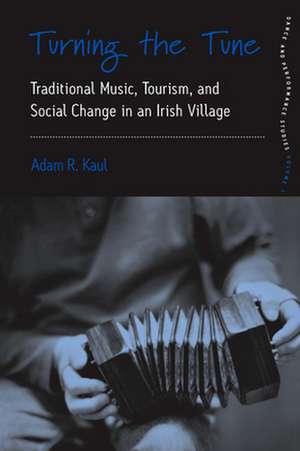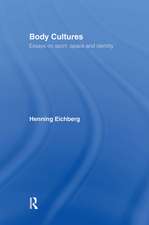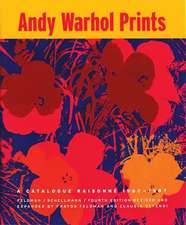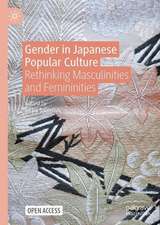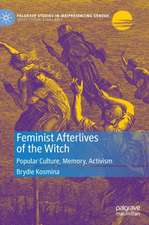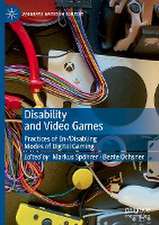Turning the Tune: Dance and Performance Studies, cartea 3
Autor Kaulen Limba Engleză Hardback – 31 aug 2009
Preț: 747.25 lei
Preț vechi: 970.46 lei
-23% Nou
Puncte Express: 1121
Preț estimativ în valută:
143.03€ • 155.42$ • 120.22£
143.03€ • 155.42$ • 120.22£
Carte tipărită la comandă
Livrare economică 21 aprilie-05 mai
Preluare comenzi: 021 569.72.76
Specificații
ISBN-13: 9781845456238
ISBN-10: 1845456238
Pagini: 200
Dimensiuni: 159 x 17 x 236 mm
Greutate: 0.45 kg
Editura: BERGHAHN BOOKS INC
Seriile Dance & Performance Studies, Dance and Performance Studies
Locul publicării:United Kingdom
ISBN-10: 1845456238
Pagini: 200
Dimensiuni: 159 x 17 x 236 mm
Greutate: 0.45 kg
Editura: BERGHAHN BOOKS INC
Seriile Dance & Performance Studies, Dance and Performance Studies
Locul publicării:United Kingdom
Notă biografică
Adam Kaul is the author of several articles about traditional music, tourism, and the economics of musical performance in Ireland, where he has conducted extensive fieldwork. He was an Honorary Research Associate with the Department of Anthropology at the University of Durham from 2005-2008, and is currently an Assistant Professor of Anthropology at Augustana College in Rock Island, Illinois, where he contributed to the establishment of the college's Anthropology Program.
Cuprins
Chapter 1. Introduction Conceptual Orientation Conceptual Organization Doolin PART I: REMEMBERED HISTORY Chapter 2. The Old Days Ethnography, History and Memory Subsistence and Seasonality Argonauts of the Eastern Atlantic Seasonality Tourism in Clare in 1859 (On the Origins of a New Species) Traditional Irish Music of the Old DaysA" The Ceili and the Crossroads Dance The Country House Dance The Dance Halls and The Ceili Bands Early Collections and Early Sessions Conclusions Chapter 3. The Revival A Changing Economy The Folk Revival Internal Changes in Irish Music The Revival Arrives Turning the Tune Conclusions PART II: MOVING IN AND MOVING THROUGH Chapter 4. The Celtic Tiger Celtic Tourism Mass Tourists Coach Tours TravelersA", Working Tourists, and Visitors Conclusions Chapter 5. Locals and Blow-ins Locals Blow-ins Negotiations of Belonging Conclusions PART III: CHANGE AND CONTINUITY Chapter 6. Consolidation and Globalization Traditional Music of the Celtic Tiger Doolin's Celtic Music Industry Bands and Sessions, Performing and Playing Paying to Play Conclusions Chapter 7. Adoption and Approriation Appropriation Adoption Complementary Discourses Phenomenology of the Session Premeditated Spontaneity Music as a Conversation Perfect Embodiment and Good Craic Conclusions Chapter 8. Conclusions History, Globalization, and Tourism Appropriation, Tradition, and Cosmopolitanism The Trope of Authenticity Credibility One's Relationship to the Locale One's Epistemological Relationship to the Music Immediate Context Seasonality The Interaction of Personalities Good Man, Yourself Bibliography Index
Recenzii
"A book of rich description and penetrating insight, Turning the Tune pulls the reader into a complex world of music making and social interaction in an Irish coastal village. Through a compelling reflexive voice, Kaul gives us a vivid sense of present experience and remembered pasts in Doolin, County Clare...This beautifully written book will provide music to the ears of all who take an interest in Ireland, tourism, music and social change." -Tamara Kohn, University of Melbourne Adam Kaul has provided his readers with a detailed, admirable account of musical life [in] Doolin, County Clare, arguably the most visible context for Irish instrumental music-making in the world. The immediacy of this narrative not only brings the reader into the inner circle of Doolin's sessions, but also clarifies, enlarges, and engages the context in ways that may surprise the reader.A" -Sean Williams, Evergreen State College "[This book] addresses some important issues in music study - the commodity, professionalization, the affective content of musical 'identities' - with a keen anthropological eye and a subtle reflexivity. The description of sessions is often excellent - many have tried, few quite so successfully!" -Martin Stokes, Oxford University
